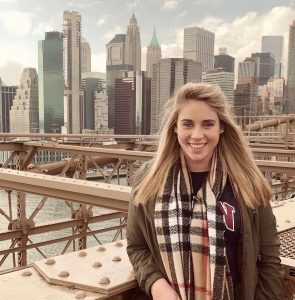GREENEVILLE – Earning a college degree transforms lives by creating opportunities that might otherwise not exist for students.

Amelia Schroeder

Congresswoman Diana Harshbarger
Along that path, some students benefit from the assistance of support programs on college campuses that expose them to future possibilities and encourage them to stay on track. These include the federal TRIO programs for first-generation and low-income college students.
Representatives of these programs in East Tennessee celebrated these students Monday, Nov. 8, during the National First-Generation College Celebration. Tusculum University, East Tennessee State University, Northeast State Community College and Pellissippi State Community College partnered to hold the virtual First-Generation Student Summit.
One of the speakers was Congresswoman Diana Harshbarger, a Republican who represents Northeast Tennessee in the U.S. House of Representatives. Harshbarger is a first-generation student, meaning neither of her parents earned a bachelor’s degree. She was inspired to pursue college by two high school friends, attended ETSU and earned her Doctor of Pharmacy degree from Mercer University College of Pharmacy.
“I know the value of hard work and dedication that’s needed for first-generation students to succeed,” Harshbarger said. “I had many challenges on my road to success but found the strength and fortitude to overcome every single one of them. Looking back on my experiences, if I could go back and give myself advice or give advice to any fellow first-generation students, it would be this: Have the confidence to become whatever you dream or desire to be. Don’t let a lack of income or education hinder you from pursuing your dream.”
TRIO programs include Educational Talent Search, Upward Bound and Upward Bound Math and Science for pre-college students and Student Support Services for college students. Amelia Schroeder participated in Talent Search and Upward Bound at Tusculum and SSS at ETSU and is now seeking a doctorate in biostatistics at the University of Pennsylvania.
“From a small goat farm in Northeast Tennessee to an Ivy League university, Amelia is proof that our first-generation students have what it takes to change the world,” said Meagan Stark, associate director of SSS at Tusculum. “Being involved with the TRIO programs showed her the possibilities and opportunities of higher education.”
Schroeder said TRIO opened doors for her that she thought were closed, and she is grateful for its programs.
When she was at Chuckey-Doak Middle School, she said she made one of her better decisions – joining Talent Search. She said this program was a great building block and enabled her to learn more about opportunities for higher education and become connected with other first-generation students who were interested in college.
Then at Chuckey-Doak High School, she joined Upward Bound. By then, she had a better idea of her academic goals and knew she wanted to go to college. Upward Bound helped her make that happen.
“My Upward Bound mentors showed me a lot of scholarship opportunities,” Schroeder said. “My Upward Bound counselors showed me a lot of resources to find scholarships through the colleges and through the community – even specific ones for first-generation students and underrepresented students. In doing this, I was luckily able to earn that full ride to college.”
Upward Bound gave her the opportunity to travel to New York, New Orleans and Chicago, which opened her eyes to different regions and people. That gave her the courage when she was in college to participate in a research program that took her to Fort Collins, Colorado, and led her work to be published. This experience has enabled her to go straight from a bachelor’s degree to the doctoral program.
Her experience in Student Support Services at ETSU, where she received a degree in math, was also memorable. She praised the work of SSS, saying retention and graduation rates for students in that program are significantly higher than for similar students who are not. She surmises that is because the SSS staff made the program feel like she had a home and a family while she was at ETSU. She said SSS staff was encouraging and reminded her she was engaged in an important endeavor. The staff also went the extra mile to help her.
“College can put a lot on a student, and with Student Support Services, I always felt like I had a place where I could be surrounded by family,” Schroeder said. “To me, that is so important when you are away from home trying to do something that no one else in your family has ever done. Being surrounded by other students going through the same thing, working hard to achieve their academic goals, with staff that will be there for you, makes things so much easier and makes you feel like you can do it.”
She specifically cited Stark, who was at ETSU at the time, as being extremely helpful as she applied for her doctoral program. She said Stark not only assisted her with the paperwork elements but also the emotional components associated with heading to graduate school.
Even though she is now a long way from her home, Schroeder said her time in Upward Bound remains with her in Philadelphia.
“Every day I walk to my office or class, I carry this backpack that I received years ago from Tusculum’s Upward Bound,” she said. “It has their name and their logo on it. I carry it through the city and all over the campus with pride. I’m just so proud and so grateful for the impact that these programs have had on me.”


